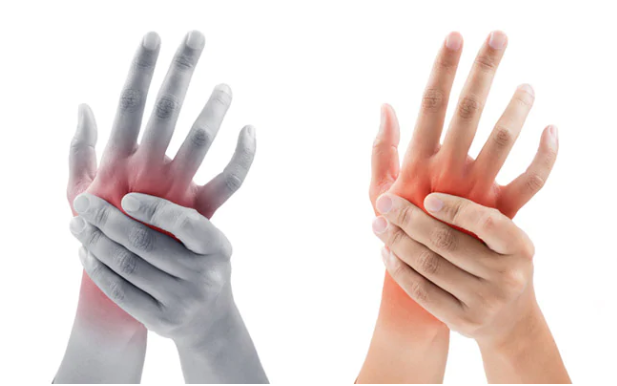Tingling sensations in the body can be unsettling, especially when they occur unexpectedly or frequently. For many people, experiencing pins and needles in their limbs or even throughout their body can be an alarming symptom. The cause of such sensations may vary, and one common cause is anxiety. But is anxiety truly capable of causing tingling all over the body? In this article, we'll explore the difference between anxiety tingling and MS tingling and how to distinguish the two. We'll also discuss why anxiety can lead to these sensations, and whether or not they are something to worry about.
Understanding Anxiety and Its Symptoms
Anxiety is a mental health condition that can manifest in many ways. For some people, it can lead to physical symptoms, such as chest tightness, rapid heartbeat, or muscle tension. One of the lesser-known physical symptoms of anxiety is tingling or a sensation of “pins and needles,” which can occur in different parts of the body. This sensation is often linked to the body's natural “fight-or-flight” response, which triggers changes in the nervous system when a person is anxious or stressed.
When the body enters this state, it can experience a temporary reduction in blood flow to certain areas, causing nerve sensations like tingling, numbness, or prickling sensations. Anxiety-induced tingling may occur in the hands, feet, face, or even all over the body. It can feel unsettling, but it is generally harmless and temporary.
What is the Difference Between Anxiety Tingling and MS Tingling?
Although tingling sensations are common in both anxiety and Multiple Sclerosis (MS), the causes and patterns of these sensations can differ. Understanding the difference between anxiety tingling and MS tingling is crucial for determining whether anxiety is the root cause of the symptoms or if further medical evaluation is necessary.
Anxiety Tingling
In anxiety, tingling is often associated with hyperventilation, rapid breathing, or a rushed stress response. This can cause blood vessels to constrict and reduce oxygen levels in certain areas, leading to tingling sensations. Anxiety or MS tingling patterns related to anxiety are usually temporary and tend to occur during heightened states of stress or panic.
Symptoms often subside once the anxiety episode resolves, and they are less likely to present in specific patterns. The tingling may move around the body or come and go, but it is typically not persistent or progressive.
MS Tingling
On the other hand, MS tingling patterns are different. Multiple Sclerosis (MS) is a chronic neurological condition that affects the central nervous system. People with MS may experience tingles as part of a larger group of symptoms, including numbness, weakness, and vision changes. MS-related tingling is often localized to specific areas, such as one arm, one leg, or one side of the face, and it can be persistent or progressive.
Unlike the short-term tingling caused by anxiety, MS tingling is typically more consistent and may last for longer periods. It may also be accompanied by other neurological symptoms like muscle weakness, balance issues, and fatigue. If tingling persists over time or is accompanied by other neurological changes, it is important to consult a healthcare professional for proper evaluation and diagnosis.
Why Does Anxiety Cause Tingling?
When you're anxious, your body's nervous system goes into overdrive. This heightened state of alertness can trigger a range of physical symptoms. One common explanation for tingling is the fight-or-flight response. When you're anxious, your body prepares to “fight” or “flee” from perceived danger, even if the threat is not real. As part of this response, your body releases stress hormones such as adrenaline, which can increase heart rate, blood pressure, and breathing rate.
This surge of adrenaline and the changes in circulation can temporarily affect the nervous system, leading to tingling sensations. Pins and needles anxiety can occur when the body hyperventilates during an anxiety episode, resulting in an imbalance in oxygen and carbon dioxide levels. This imbalance can cause sensations like numbness or tingling in the hands, feet, or other parts of the body.
The Connection Between Hyperventilation and Tingling
Hyperventilation is one of the most common physical responses to anxiety. When you breathe rapidly and shallowly, you expel too much carbon dioxide, which can lead to a temporary drop in the levels of this gas in the blood. This change in blood chemistry can result in constricted blood vessels and, accordingly, reduced oxygen flow to certain areas of the body. The result? Tingling or pins and needles anxiety sensations.
While hyperventilation and anxiety-related tingling are usually temporary, they can still be distressing. It's important to practice deep breathing techniques and mindfulness exercises to help regulate your breathing and calm your nervous system during an anxiety episode.
Can MS Cause Tingling All Over the Body?
Multiple Sclerosis (MS) is an autoimmune disease that affects the central nervous system, causing the immune system to attack the protective sheath around nerve fibers, leading to nerve damage. One of the most common symptoms of MS is tingling or numbness, often described as a “pins and needles” feeling.
Unlike anxiety, MS tingling pattern s can affect specific areas of the body and may be persistent or progressive. While anxiety can cause tingling to appear suddenly and subside quickly, MS-related tingling is more likely to persist and may be accompanied by other neurological symptoms such as weakness, coordination issues, or blurred vision. MS can affect any part of the body, and the sensation of tingling may occur in localized areas or in a specific pattern, such as down one arm or leg.
If tingling is accompanied by other neurological symptoms, such as muscle weakness, difficulty walking, or changes in vision, it is important to seek medical advice immediately. MS is a serious condition that requires early diagnosis and treatment.
How to Manage Anxiety-Related Tingling?
If you suspect that anxiety is the cause of your tingling sensations, there are several steps you can take to manage the symptoms. Here are some helpful tips:
- Practice Relaxation Techniques : Deep breathing exercises, meditation, and progressive muscle relaxation can help reduce anxiety and calm the nervous system. This can help alleviate the tingling sensations caused by hyperventilation and stress.
- Exercise Regularly : Physical activity can help regulate your body's stress response and improve circulation, reducing the frequency of tingling sensations.
- Seek Therapy : Cognitive Behavioral Therapy (CBT) and other forms of therapy can help you manage anxiety and prevent it from triggering physical symptoms like tingling.
- Avoid Stimulants : Caffeine, nicotine, and other stimulants can increase anxiety and exacerbation physical symptoms like tingling. Try to limit or avoid these substances.
- Consult a Healthcare Professional : If your tingling sensations are frequent, persistent, or associated with other symptoms like weakness or numbness, it's important to consult a healthcare provider to rule out any underlying medical conditions, such as MS.
Final Verdict
In conclusion, anxiety can indeed cause tingling sensations all over the body. These feelings are typically harmless and linked to the body's natural stress response. However, it's important to distinguish between anxiety tingling and MS tingling as the underlying causes and patterns can differ significantly. Anxiety-related tingling tends to be temporary and is often associated with hyperventilation, whereas MS tingling is usually persistent and localized. If you experience ongoing tingling along with other neurological symptoms, it's crucial to seek medical attention to rule out more serious conditions.
Managing anxiety through relaxation techniques and seeking professional help can go a long way in reducing or eliminating anxiety-related tingling sensations. Always consult a healthcare provider if you are unsure about the cause of your symptoms or if they persist over time.






